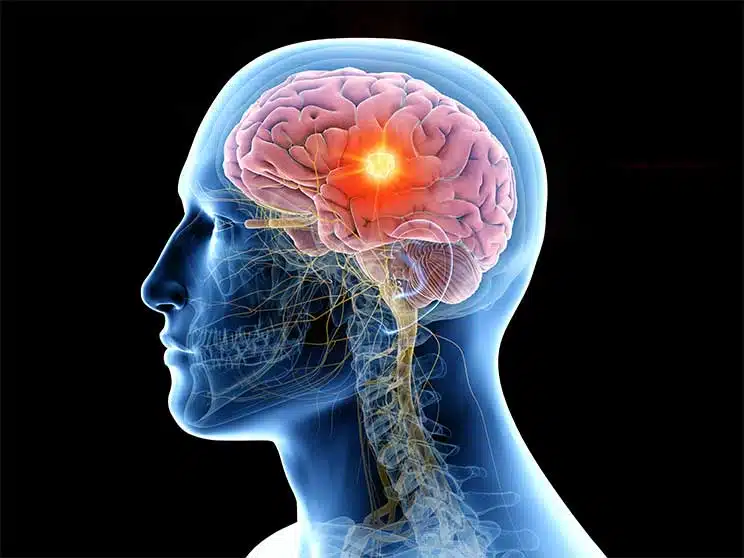How Drug & Alcohol Abuse Damages The Brain
- Drug Abuse & The Brain
- Long-Term Effects Of Drug Use On The Brain
- Alcohol Abuse & The Brain
- Alcohol & Long-Term Brain Damage
- Substance Abuse & The Adolescent Brain
- Substance Abuse Treatment

Alcohol and drug abuse can change your brain chemistry, cause physical dependence, and lead to withdrawal symptoms when you try to stop using.
Alcohol and many drugs are habit-forming. Long-term or heavy alcohol or drug use can change how your brain works, leading to poor cognition, problems with decision-making, and even brain damage.
If you abuse drugs or alcohol and experience memory problems, psychosis, sleeping problems, or other side effects, you may be struggling with alcohol or drug addiction.
Thankfully, professional addiction treatment programs can restore your mental health. In some cases, brain damage caused by substance use can be reversed.
Drug Abuse & The Brain
Many drugs change dopamine levels. Dopamine is a neurotransmitter that can regulate your mood, motivation, and other vital brain functions. It is also your brain’s reward system, which can be disrupted when drugs or alcohol are involved.
Drugs such as cocaine and methamphetamine can produce a sudden increase, or surge, in dopamine. Other drugs, such as opioids, bind to opioid receptors in your nervous system. This can cause a rush of euphoria or pleasure, or the high associated with opioid use.
If your brain relies on drugs or alcohol to produce certain chemicals, it may cause a chemical imbalance when you try to stop using. This can lead to drug withdrawal symptoms, which can be painful and severe.
Long-Term Effects Of Drug Use On The Brain
Long-term effects of drug use on the brain may include:
- sleeping problems
- hallucinations
- reduced cognitive function
- drug cravings
Your brain may not return to normal levels right away, leading to these long-term side effects. However, long-term sobriety can reduce or eliminate these side effects over time.
Keep in mind that long-term side effects may differ between drugs.
Alcohol Abuse & The Brain
Alcohol consumption slows your reaction time and affects your decision-making. Alcohol use can indirectly cause brain injuries, as you may have an increased risk of falls, car accidents, and other physical traumas when drinking alcohol.
Alcohol use also affects the hippocampus, the area of the brain that forms new memories. An impaired hippocampus can cause short-term memory loss, or the blackouts commonly linked to binge drinking.
Alcohol addiction can affect your brain similarly to opioids, stimulants, and other habit-forming drugs. If you try to quit alcohol after drinking heavily, you may experience withdrawal symptoms. This is because your brain cannot function properly without alcohol.
Alcohol Abuse & Long-Term Brain Damage
Alcohol abuse can also increase your risk of Wernicke-Korsakoff syndrome, a long-term form of encephalopathy or brain damage. This is because alcohol affects thiamine (vitamin B1) levels in your body, a common risk factor for Wernicke-Korsakoff syndrome.
Wernicke-Korsakoff syndrome can damage vital parts of the brain as well as nerve cells and brain cells. Without proper treatment, Wernicke-Korsakoff syndrome can cause amnesia, coma, tremors, and other serious side effects.
Alcohol abuse is also linked to other brain disorders, such as dementia or stroke.
Substance Abuse & The Adolescent Brain
A teenager’s brain is still developing. Substance abuse can cause permanent brain changes in a teenager.
Studies show that heavy substance abuse can affect the adolescent prefrontal cortex, a part of the brain’s limbic system. The prefrontal cortex can regulate your decision-making and cognition.
Damage done to the prefrontal cortex during development may be irreversible, leading to changes in decision-making, planning, and overall thinking.
Substance Abuse Treatment
While drug and alcohol use can hurt the brain, many negative side effects can be reversed with professional help. Restoring the brain’s health may require long-term sobriety, mental health care, and a professional addiction treatment program.
If you need drug or alcohol use disorder treatment for yourself or a loved one, ask about our addiction treatment programs today.
Our substance use disorder treatment centers provide medical detox services, management of withdrawal symptoms, behavioral therapy, mental health care, and other services.
Written by Ark Behavioral Health Editorial Team
©2024 Ark National Holdings, LLC. | All Rights Reserved.
This page does not provide medical advice.
National Institute of Neurological Disorders and Stroke - Wernicke-Korsakoff Syndrome
National Institute on Alcohol Abuse and Alcoholism - Alcohol and the Brain: An Overview
National Institute on Drug Abuse - Introducing the Human Brain
Questions About Treatment?
Ark Behavioral Health offers 100% confidential substance abuse assessment and treatment placement tailored to your individual needs. Achieve long-term recovery.
100% confidential. We respect your privacy.
Prefer Texting?
Our friendly support team is here to chat 24/7. Opt out any time.







 Learn More
Learn More








